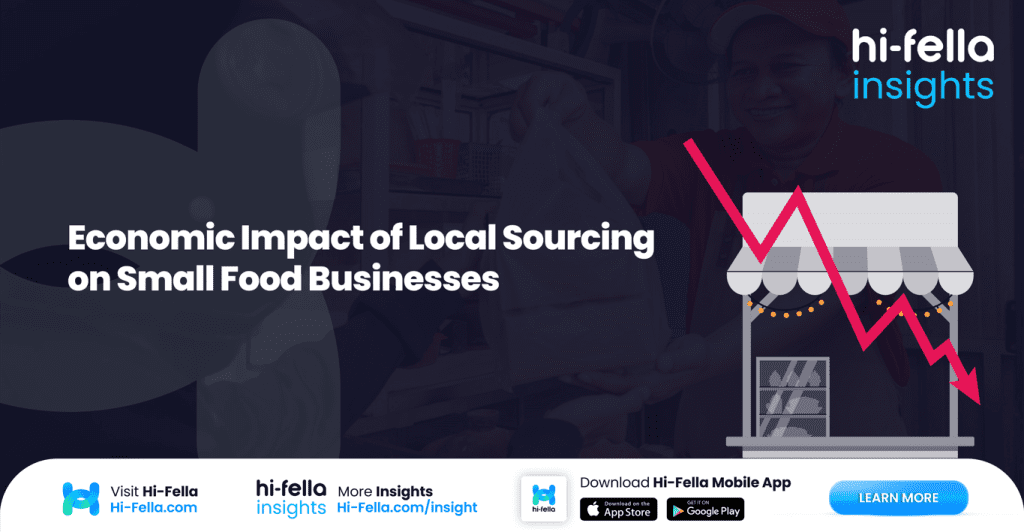When it comes to small food businesses, sourcing ingredients locally isn’t just a trendy move; it’s an economic game-changer. Let’s dive deeply into this topic, exploring case studies, thorough analysis, and real-world examples to provide insightful information about why local sourcing is a smart and impactful business decision.
Strengthening Community Economy
Purchasing from local suppliers directly boosts the local economy, creating a ripple effect where money circulates multiple times within the community. A prominent case study is the town of Asheville, North Carolina, which actively promotes local sourcing. Small restaurants and grocery stores sourcing locally there have significantly boosted regional economic growth, as each dollar spent locally generated an additional 45 cents of economic activity.
In-depth analysis indicates that money spent locally significantly strengthens community businesses through a multiplier effect, where suppliers, their employees, and other local businesses benefit directly and indirectly. Studies by Local First Arizona show that independently-owned restaurants that source locally return approximately 79% of their revenues to the local economy compared to only 30% for national chains.
Additionally, community-level economic resilience is improved, particularly during economic downturns. Regions that prioritize local sourcing tend to recover quicker economically, as observed during the 2008 recession in communities committed to local buying.
Furthermore, local sourcing fosters community identity and pride. Businesses and consumers who support local economies build stronger interpersonal connections and loyalty, enhancing community cohesion and stability.
Thus, encouraging local sourcing can lead to sustainable community economic growth, fostering long-term economic stability and resilience.
Lowering Operational Costs
Local sourcing significantly reduces transportation and logistics expenses, offering immediate financial relief to small businesses. For example, a farm-to-table restaurant in Portland reduced its operating costs by nearly 20% after transitioning from distant suppliers to local farms.
Further analysis reveals that shorter supply chains directly lower shipping costs, storage fees, and waste due to spoilage. According to research from Michigan State University, businesses sourcing locally experience reduced inventory management issues, as fresher products require less expensive storage solutions and preservation methods.
Moreover, reduced operational costs can lead to reinvestment opportunities for small businesses. Savings can be allocated to product innovation, marketing, or enhancing customer service, which directly contributes to competitive advantages.
Businesses utilizing local sourcing also benefit from streamlined operational logistics. For instance, real-time communication and close proximity to suppliers allow for faster problem-solving, significantly reducing downtime and improving productivity.
Thus, careful cost analysis shows that sourcing locally is financially advantageous, improving overall operational efficiency and competitiveness.
Enhancing Brand Appeal
Businesses that market their use of local ingredients significantly improve their appeal to today’s ethically conscious consumers. For instance, “Sweetgreen,” a rapidly expanding salad chain, has built its entire brand around transparency and local sourcing, boosting customer loyalty and engagement substantially.
Market research consistently shows consumers prefer businesses demonstrating social responsibility, with studies from Nielsen revealing that 66% of global consumers are willing to pay more for sustainably sourced products.
Moreover, branding around local sourcing provides clear differentiation in crowded markets. Analysis from the Harvard Business Review highlights that unique value propositions, such as local sourcing, create strong brand positioning and higher customer retention.
Additionally, successful marketing of local sourcing creates positive brand narratives that customers actively promote. User-generated content and social media engagement from supportive consumers amplify brand visibility without additional marketing spend.
Ultimately, businesses investing in brand storytelling about local sourcing successfully foster deep emotional connections, translating into sustained economic advantages.
Creating Collaborative Networks
Local sourcing naturally fosters collaborative networks between suppliers and small businesses. A case in point is “Blue Hill at Stone Barns,” a renowned farm-to-table restaurant in New York, which collaborates closely with local farms, enhancing both quality and consistency of supply.
Through detailed analysis, these collaborative relationships lead to enhanced mutual trust and better overall service. Suppliers provide priority and flexibility to consistent business partners, resulting in better product availability and quality assurance.
Collaborative networks also spark innovation. Businesses regularly exchange feedback with suppliers, encouraging continuous improvement, such as developing unique products tailored to customer preferences.
These networks extend beyond immediate business transactions. Local sourcing networks frequently engage in joint promotional events and collaborative marketing, increasing community visibility and customer base.
Thus, developing collaborative local networks significantly enhances business resilience, innovation potential, and economic growth.
Mitigating Supply Chain Risks
Sourcing locally significantly reduces exposure to risks from global supply chain disruptions, such as geopolitical tensions, pandemics, or environmental disasters. For example, during COVID-19, businesses with strong local supply chains experienced less disruption compared to those reliant on international suppliers.
Further analysis shows businesses dependent on international sources face increased vulnerability to price volatility and availability fluctuations. Local sourcing substantially mitigates these risks through closer proximity and communication.
Local suppliers provide quicker and more flexible responses to emergencies, reducing downtime and ensuring uninterrupted operations. For instance, when floods impacted regional agriculture in California, locally connected businesses could quickly adapt their sourcing strategies.
Moreover, local sourcing enhances transparency and traceability, critical factors for quality assurance and food safety compliance, directly contributing to consumer trust and regulatory ease.
In summary, detailed risk analysis clearly indicates local sourcing creates robust, secure, and resilient supply chains, significantly enhancing business sustainability and continuity.
Stimulating Job Creation
Supporting local producers directly creates local employment opportunities, significantly benefiting community economic health. For example, the “Farmers Market Coalition” in the U.S. reports substantial local job creation, averaging 3 new jobs per local sourcing initiative established.
Analysis from multiple regional economic studies demonstrates local sourcing substantially reduces unemployment rates and increases average household incomes. Stronger local employment means more disposable income, feeding back into small businesses.
Furthermore, job creation through local sourcing fosters workforce skill development. Employees gain diverse experiences and expertise within interconnected local businesses, improving community skill sets and employability.
Additionally, stable local employment supports community development, reducing social welfare dependencies and enhancing economic stability. Communities with robust local employment attract further investment and business startups.
Therefore, strategic local sourcing directly impacts employment positively, creating vibrant, economically prosperous, and resilient communities.
Join Hi-Fella and Expand the World Today!
Join Hi-Fella and Expand the World Today! By joining Hi-Fella, you’re not just supporting sustainable sourcing—you’re becoming part of a vibrant ecosystem that uplifts local producers, empowers small businesses, and sparks real economic transformation. Whether you’re a food entrepreneur, local supplier, or conscious consumer, Hi-Fella connects you with like-minded individuals who believe in building stronger, more resilient communities through ethical practices and meaningful collaboration.
Explore new opportunities, gain valuable insights, and be the change your community needs. It all starts with one step—join Hi-Fella today and make a lasting impact! Join the HiFella movement today—encouraging local sourcing and strengthening our communities one purchase at a time!








